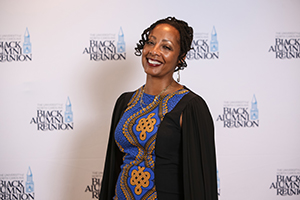Giselle Corbie MD, MSc
2021 McClinton Outstanding Faculty Staff Award

Dr. Giselle Corbie teaches a highly sought-after seminar on health disparities to second-year medical students.
Chances are good more students than usual tried to take the class this year, given the racial inequities in health care that have been exposed by the COVID-19 pandemic.
Corbie, Kenan Distinguished Professor in the departments of Social Medicine and Medicine at the UNC School of Medicine, also directs the UNC Center for Health Equity Research, or CHER.
And she is the 2021 Hortense K. McClinton Outstanding Faculty Award recipient.
“Dr. Corbie and I have been acquaintances for 15 years, but I’ve worked more closely with her over the last five years,” says Jennifer Webster-Cyriaque, Ph.D., who has a joint appointment in the School of Dentistry and Department of Microbiology and Immunology in the School of Medicine. Webster-Cyriaque nominated Corbie-Smith for the award.
“She’s an impressive individual with her finger on the pulse of where health care needs to be,” Webster-Cyriaque says. “I think the rest of the world is now catching up in terms of what health equity really means and how it’s playing out when we see the disparity with the pandemic. That’s her life’s worth. She’s a vocal advocate for health equity. She’s very good at helping other people awaken their consciousness toward these issues.”
Justin Oberlander, Ph.D., professor and chair of Social Medicine, School of Medicine, says Corbie has been instrumental to many UNC students.
“Dr. Smith’s extensive teaching with medical, graduate and undergraduate students has been enormously impactful, and there is no doubt that her teaching has made a major difference in the lives and careers of many Carolina students.”
Oberlander says Corbie’s seminar “introduces students to cutting-edge research on the sources of racial/ethnic disparities and strategies for enhancing health equity.” He also says in part because of her “extraordinary and prolific research agenda,” and her position as CHER director, she has mentored countless students on research projects and given them “the opportunity to learn from her via collaboration on those projects.”
Webster-Cyriaque likens Corbie to the woman after whom the award is named, saying that she has broken many glass ceilings throughout her career.
“She, too, has made outstanding contributions to the Carolina community,” Webster-Cyriaque writes of Corbie in her nomination letter. “She has served as the principal investigator of many community-based, participatory research projects focused on disease risk reduction in rural, racial and ethnic minorities. In her numerous roles, she brings communities, faculty and health care providers into working relationships to strive collectively toward the goal of improved health.”
Corbie’s mother is a nurse, so she grew up around medicine. She studied biology and genetics at Cornell University, graduating in 1986. Eventually, she decided to pursue a career in medicine.
After attending a lecture on health disparities, she became more interested in the subject. Talk about a foreshadowing.
“When we think about what this award means, in my opinion, her service to the community, to the University and to the students has made a palpable difference in this space. I think she embodies the principles of the award,” Webster-Cyriaque says.
In 2018, Corbie was elected president of the Society of General Internal Medicine. In 2019, she was named associate provost of the Institute of Rural Innovation at UNC.
Webster-Cyriaque didn’t tell Corbie about the nomination, opting instead for it to be a surprise.
“I nominated her and didn’t even tell her,” she says. “I’m absolutely glad she won. Likewise, I was happy when she came here to UNC from Emory University. She has the ability to really look at the long game, and when people are not necessarily grasping the importance of some of these things, she’s able to, over time, kind of lay the groundwork to help them understand. Her addition has really made a difference at UNC.”